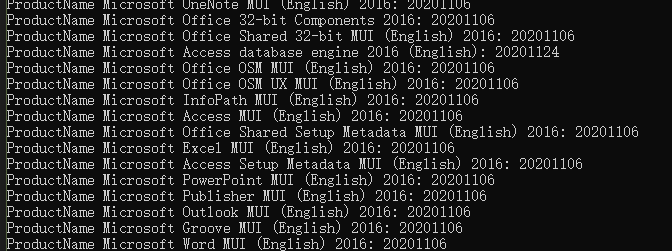One of the ways is with AssocQueryString and a ProgId from Office
For example, with Winword =>
string sProgId = "Word.Document";
int nLength = 260;
var sbAssociatedExe = new StringBuilder(nLength);
HRESULT hr = AssocQueryString(ASSOCF.ASSOCF_NONE, ASSOCSTR.ASSOCSTR_EXECUTABLE, sProgId, null, sbAssociatedExe, ref nLength);
if (hr == 0)
{
FileVersionInfo fvi = FileVersionInfo.GetVersionInfo(sbAssociatedExe.ToString());
MessageBox.Show(string.Format("Winword = {0} {1}", fvi.FileDescription, fvi.FileVersion));
}
Declarations :
public enum HRESULT : int
{
S_OK = 0,
S_FALSE = 1,
E_NOINTERFACE = unchecked((int)0x80004002),
E_NOTIMPL = unchecked((int)0x80004001),
E_FAIL = unchecked((int)0x80004005)
}
[Flags]
public enum ASSOCF : uint
{
ASSOCF_NONE = 0x00000000,
ASSOCF_INIT_NOREMAPCLSID = 0x00000001, // do not remap clsids to progids
ASSOCF_INIT_BYEXENAME = 0x00000002, // executable is being passed in
ASSOCF_OPEN_BYEXENAME = 0x00000002, // executable is being passed in
ASSOCF_INIT_DEFAULTTOSTAR = 0x00000004, // treat "*" as the BaseClass
ASSOCF_INIT_DEFAULTTOFOLDER = 0x00000008, // treat "Folder" as the BaseClass
ASSOCF_NOUSERSETTINGS = 0x00000010, // dont use HKCU
ASSOCF_NOTRUNCATE = 0x00000020, // dont truncate the return string
ASSOCF_VERIFY = 0x00000040, // verify data is accurate (DISK HITS)
ASSOCF_REMAPRUNDLL = 0x00000080, // actually gets info about rundlls target if applicable
ASSOCF_NOFIXUPS = 0x00000100, // attempt to fix errors if found
ASSOCF_IGNOREBASECLASS = 0x00000200, // dont recurse into the baseclass
ASSOCF_INIT_IGNOREUNKNOWN = 0x00000400, // dont use the "Unknown" progid, instead fail
ASSOCF_INIT_FIXED_PROGID = 0x00000800, // the Init() pszAssoc value is a ProgId that should not be mapped using the current user defaults
ASSOCF_IS_PROTOCOL = 0x00001000, // the Init() pszAssoc value is an uri scheme (not including the ":") that should be mapped using the current user defaults
ASSOCF_INIT_FOR_FILE = 0x00002000, // use this flag when specifying ASSOCF_INIT_FIXED_PROGID if the ProgId corresponds with a file extension based association
ASSOCF_IS_FULL_URI = 0x00004000, // Used to specify that full http/https URI is being passed for target resolution
// Only one of ASSOCF_INIT_FIXED_PROGID, ASSOCF_IS_PROTOCOL or ASSOCF_IS_FULL_URI can be specified at a time.
ASSOCF_PER_MACHINE_ONLY = 0x00008000, // Enforces per-machine association look-up only and avoid HKCU.
// For http/https uri associations, this enables selecting the OS default browser, that is a controlled by
// policy settings, instead of the default browser.
ASSOCF_APP_TO_APP = 0x00010000,
}
public enum ASSOCSTR
{
ASSOCSTR_COMMAND = 1, // shell\verb\command string
ASSOCSTR_EXECUTABLE, // the executable part of command string
ASSOCSTR_FRIENDLYDOCNAME, // friendly name of the document type
ASSOCSTR_FRIENDLYAPPNAME, // friendly name of executable
ASSOCSTR_NOOPEN, // noopen value
ASSOCSTR_SHELLNEWVALUE, // query values under the shellnew key
ASSOCSTR_DDECOMMAND, // template for DDE commands
ASSOCSTR_DDEIFEXEC, // DDECOMMAND to use if just create a process
ASSOCSTR_DDEAPPLICATION, // Application name in DDE broadcast
ASSOCSTR_DDETOPIC, // Topic Name in DDE broadcast
ASSOCSTR_INFOTIP, // info tip for an item, or list of properties to create info tip from
ASSOCSTR_QUICKTIP, // same as ASSOCSTR_INFOTIP, except, this list contains only quickly retrievable properties
ASSOCSTR_TILEINFO, // similar to ASSOCSTR_INFOTIP - lists important properties for tileview
ASSOCSTR_CONTENTTYPE, // MIME Content type
ASSOCSTR_DEFAULTICON, // Default icon source
ASSOCSTR_SHELLEXTENSION, // Guid string pointing to the Shellex\Shellextensionhandler value.
ASSOCSTR_DROPTARGET, // The CLSID of DropTarget
ASSOCSTR_DELEGATEEXECUTE, // The CLSID of DelegateExecute
// a string value of the uri protocol schemes, for example "http:https:ftp:file:" or "*" indicating all
ASSOCSTR_SUPPORTED_URI_PROTOCOLS,
ASSOCSTR_PROGID, // The ProgId provided by the app associated with the file type or uri scheme based on user default settings.
ASSOCSTR_APPID, // The AppUserModelID of the app associated with the file type or uri scheme based on user default settings.
ASSOCSTR_APPPUBLISHER, // THe publisher of the app associated with the file type or uri scheme based on user default settings.
ASSOCSTR_APPICONREFERENCE, // The icon reference of the app associated with the file type or uri scheme based on user default settings.
ASSOCSTR_MAX // last item in enum...
}
[DllImport("Shlwapi.dll", SetLastError = true, CharSet = CharSet.Auto)]
public static extern HRESULT AssocQueryString(ASSOCF flags, ASSOCSTR str, string pszAssoc, string pszExtra, [Out] StringBuilder pszOut, ref int pcchOut);


